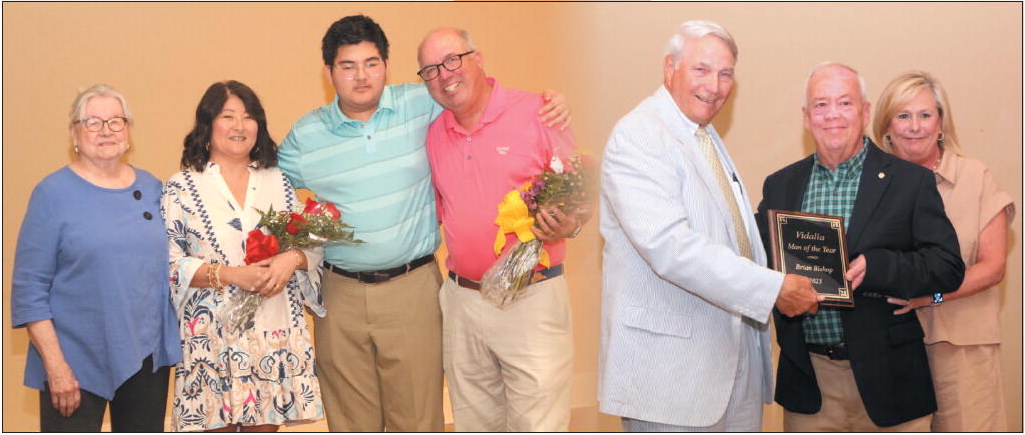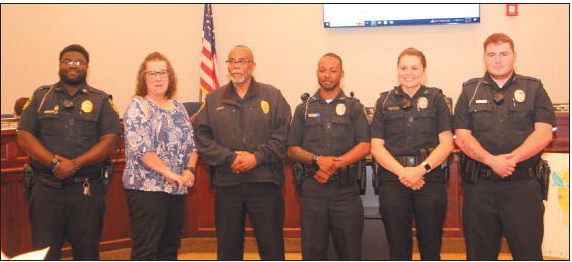chatWITH… Jack Parson
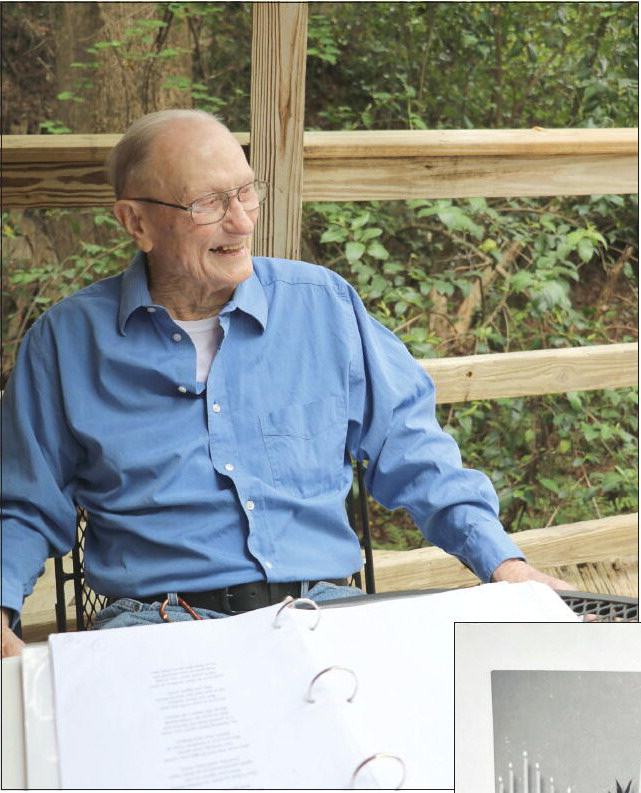

A chatWITH… Jack Parson
If you can fill the unforgiving minute With sixty seconds’ worth of distance run, Yours is the Earth and everything that’s in it, And — which is more — you’ll be a Man, my son!
If by Rudyard Kipling “I have analyzed myself as a person of opportunity,” Jack Parson said. “When an opportunity arose, I took it, regardless of the possible outcome. I wanted to be something. I didn’t know what. I only knew I wanted to do better.” Jack Parson has filled “the unforgiving minute,” as he has seized a variety of opportunities in his eightynine years of living. “In my lifetime, I have had three main things to guide me: Rudyard Kipling’s, “If”; William Earnest Henley’s, “Invictus”; and Napoleon Hill’s, Think and Grow Rich.” These three foundational sources inspired Jack Parson’s determined and ultimately successful desire “to do better.” Jack Parson was born on May 5, 1932, in Nicholls, Georgia, and was raised by his grandmother, Harriett Busby Gibson. They would later relocate to Swainsboro, Georgia, where he graduated from high school. Though he doesn’t remember much about his grade school years, he does remember his beginnings as an entrepreneur. His first business endeavor was selling boiled peanuts on the street for a nickel a bag. “I was about seven or eight. I remember one day I sold twelve bags of peanuts and walked home with sixty cents,” Mr. Jack recalled, chuckling at the memory of his riches. At the age of fourteen, he went to work for an uncle who owned a soda fountain in Nicholls. Even at such a young age, “I quickly learned to run the Soda Fountain,” Mr. Jack said. “I was the soda jerk.” With his earnings, it was Mr. Jack that paid the family’s grocery bill.
When he and his grandmother moved to Swainsboro in 1948, he left a “three-dollar-a-week job for something better,” he said. “I went to work for Bill Black, a pharmacist in Swainsboro. He just happened to need somebody to run his soda fountain for him. Because of my experience working for my uncle, I was pretty knowledgeable about it. So he hired me. I didn’t ask him what the pay was, but my first paycheck was for $18.55.” He emphasized the thrill of the memory with a snap and a wink.
After graduating from high school, he went to the University of Georgia, where he says he “took three subjects and failed five” his first quarter. “They invited me to return to Swainsboro pretty quickly,” he said, laughing at himself. Despite his joke, he did really well in his English classes. “I was always good at Literature. Everywhere I went, I always made an A in those classes.” After his time in Athens, he moved to Vidalia and worked for his uncle, Jack Gibson at Jack’s Drive-In, the old Vidalia social hot spot. “I lived with Jack for about a year, year and a half. Then I went back to school at Southern College of Pharmacy in Atlanta. I spent a year there. I did okay, but I decided that was not for me. I came back to Vidalia and started working for Uncle Jack again. But my aunt insisted I get an education, and I’m grateful to her for it.” Mr. Jack went on to study at Georgia Military College, where he graduated. “I made officer the first year…then lieutenant. I was floor commander and was in charge of a crack-drill squad.” After his time at Georgia Military College, Mr. Jack returned to the University of Georgia and studied business administration. Though he reentered the work force full-time before graduating, his studies proved useful in his future as an entrepreneur.
“Every adversity, every failure, every heartbreak, carries with it the seed of an equal or greater benefit.”
Napoleon Hill, Think and Grow Rich
“On December 5, 1955, I was drafted into the army…Because of my time at GMC, I was given a platoon,” Mr. Jack said. It was during his military service that he met an influential friend, Randolph Carr. “He and I got to be friends through National Guard. He gave me a book by Nepoleon Hill—Think and Grow Rich,” he said. “It’s not about wealth. It’s about happiness. It’s about success and what it means to be successful. I read this book when I was about twenty-seven, and it changed my life in the sense that it gave me a direction. It showed me I could do things that I never knew I could. It was Rudyard Kipling and William Ernest Henley, who had given me a model to live by. But it was Napoleon Hill that gave me a sense of self-worth, enough to believe that I could do what I wanted to do, even if I didn’t know what that was yet.”
After his training in the National Guard, Mr. Jack bought into the cosmetic business. “Some friends and I purchased a state franchise for Lena Horne cosmetics. I lived in Atlanta for a couple of years and operated it. I’d come home most weekends, but would live with Randolph Carr in Atlanta during the week.” One Monday morning on his way back to Atlanta continued from page
from Swainsboro, a random stop in Wrightsville changed his life. “Now, I had never stopped there before except when a policeman stopped me for speeding one time. But I saw this little restaurant that I’d passed hundreds of times. I drove on by. But about a mile out of town, for some reason, I turned around and went back.” It was here at this forgotten little restaurant that he happened to meet the woman who later became his wife: Martha Elizabeth Blizzard.
“My wife was a fabulous person,” Mr. Jack said. “She was one of the sweetest, nicest, people. Straight up, honest, well-spoken, intelligent. I always told her she was smarter than me. She always kind of laughed it off, but she knew it, too. We had fifty-five beautiful years together.” Though they began their married life in Swainsboro, they raised their family in Vidalia. Together, they had three children: Denise, Frank, and Michael. Given the Parson legacy here in Toombs County, the fact that the couple met in a restaurant is ironic, even omen-like.
Locally, Jack Parson is known for his work in the restaurant business. However, prior to his move to Vidalia, he worked with his cousin, Carlos Mixon— a cousin he described as more of a brother. “Carlos had an auction company, a farm equipment company. I’d never sat on the seat of a tractor in my life, but I started working in that auction business for him,” Mr. Jack said. In three years of working for his cousin, he was promoted from handyman to a partner in profits. “Carlos employed me to help him run the business. He did all the bookkeeping and I did all the buying and managing of the business.” Later, Mr. Jack and Carlos went into business together and revived a Ford tractor franchise in Lyons. “He was the general manager, and I was the man on the ground. I managed the sales force.” It was this endeavor that led Mr. Jack and his family to Vidalia, where his interest in the farm equipment sales gave way to the restaurant business.
Mr. Jack got his first taste for the food service industry while working at Jack’s Drive-In. Later, Mr. Jack would open and run Captain’s Corner—another partnered investment with his cousin, Carlos. “It was his idea. He was the pencil man and I did the footwork.” After about ten years in the restaurant business, “I bought this piece of property, an old truckstop, in 1976,” Mr. Jack said. “Now why? I don’t know why. I didn’t have any money. I had to borrow every penny. But I bought these four acres of land here and later turned that truckstop into a white tablecloth restaurant—a classy joint. And I’m an old country boy! I didn’t know anything about class.”
The Seawinder was the name of that “classy joint,” and it was a very successful business for a time. About a year after The Seawinder opened, Mr. Jack wandered down into the wooded area behind the restaurant. “I walked down in here with these big, tall, beautiful trees, and thought ‘Gosh, we’ve gotta do something with this,’” he said. One day, his daughter Denise suggested, “Dad, why don’t you open up a bar down here.” And so the idea was born.
“I had a friend named Arlie Gordon…a young architect not doing anything at the time. We came and looked at the property one day, and on the side of a paper sack or something, he drew up [The Tree House].” Mr. Jack also had a contact at the Atlantic Wood Yard with access to a lot of treated lumber that wasn’t going to be used. “To make that story short, [his contact] piled up on this property all the lumber it took [to build] this place and all for about $200.” So with those materials, “Arlie, his father, and his brother built The Tree House.” Not wanting to disturb the canopy of trees that made the space so beautiful, they built around the trees rather than cutting them down during construction.
After they sold The Seawinder in 1998, the Tree House was still just a bar in the woods. “All we had was a bar. But we’re restaurant people,” Mr. Jack said. “So we started serving food on this deck. Every night was a party.” Using the same recipes from their days at Captain’s Corner and The Seawinder, they served up their locally famous steak and shrimp “on cast iron frying pans and pots,” delivered to the table straight from their pop-up kitchen. In 1999, they built on a kitchen, and the bar in the woods that served a little food turned into a fully functioning restaurant.
Thanks to Martha Parson, another form of food service that Jack Parson took on was the art of baking fruitcakes. “I was up there in the kitchen at The Seawinder working my butt off, and my wife walked in. It was November,” he recalled. “She said, ‘I’m going to bake some fruitcakes to sell. We don’t have any money for Christmas.’ I said ‘Go for it.’” When Mrs. Martha started baking these fruitcakes, she did not have a way to box them, so Mr. Jack built her one, based on the old apple crates with slat sides. “I made the molds for the cakes and boxes to package them in, and we started selling fruitcakes at the restaurant. We sold over one hundred fruitcakes that year, and I’ve been baking them and selling them every year since up until last year,” he said. “My wife was a very conservative lady, and I scared the heck out of her,” Mr. Jack said of his compatibility with Mrs. Martha. “She knew our limits; I did not. I’ve never had any. But we were a unit.” The couple would work together until Mrs. Martha was diagnosed with dementia. “She went into a deep dementia. In early 2016, she woke up one morning and didn’t know me, didn’t know who I was. She didn’t know where she was. She was frightened, angry, suspicious. This went on until May. And then one day, she came back to me. For two months, we sat and talked and laughed and courted again. In her mind, we were not married yet. She was a young person again. She giggled! She was her old self for those two months we had together. She was twenty-three again.” Martha Parson passed away on November 12, 2016.
“The death of my wife left me really troubled, distraught. I got up around four in the morning. Couldn’t sleep. Couldn’t control my mind. So I sat down in my chair and pulled out a pad I keep for writing notes. and I started writing poetry. I wrote three poems that night. Since then, I’ve been writing poetry. It’s been my therapy,” he said. During our chat, Mr. Jack recited parts of William Ernest Henley’s poem, “Invictus” — one of the poems around which he molded his life: It matters not how strait the gate, How charged with punishments the scroll, I am the master of my fate: I am the captain of my soul.
“I thought I was a self-made man,” he said. “But when I lost Martha, I learned I was not in control of my life. I thought I had done all that I have done on my own, but I realized that I had other help available to me. This was how I found God.” As a young man, from about twelve years into his early twenties, Jack Parson wanted to be a writer. “I wanted write, man. I found a library when I was eight years old, and I just loved it. I was going to be an author. But you know, circumstances dictated I do something different,” he said. Today, at eighty-nine years old, he is realizing his dream as his collection of poems is large and growing larger. He is a poet. He writes of his parents, whom he didn’t know. He writes about his wife, his family. He writes about his life, his striving for success in a way that is relatable to readers. Mostly, he writes about the true master of his fate, the God he now seeks to serve.
I do not know where God’s great plan will lead me from now on.
At last I know that He’s in charge.
I should have always known.
Jack Parson
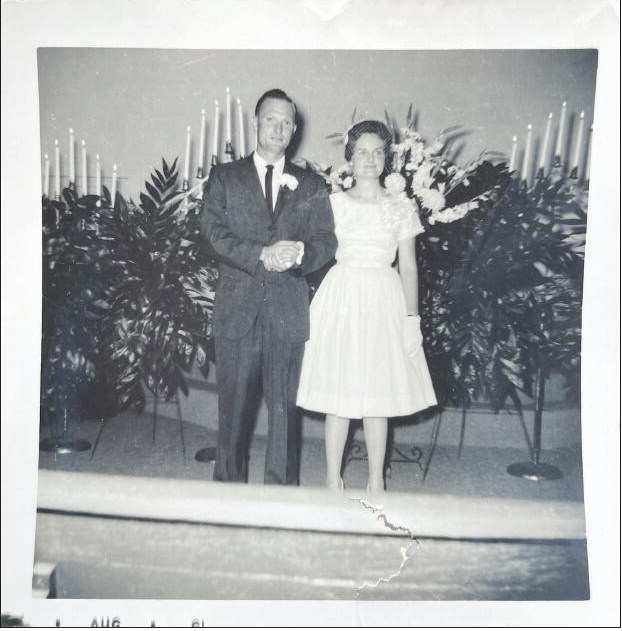
DAY ONE OF FIFTY-FIVE — “She was one of the sweetest, nicest, people. Straight up, honest, well-spoken, intelligent. I always told her she was smarter than me. She always kind of laughed it off, but she knew it, too. We had fifty-five beautiful years together,” Mr. Jack said. “I miss her every day.” Pictured is the happy couple on their wedding day.
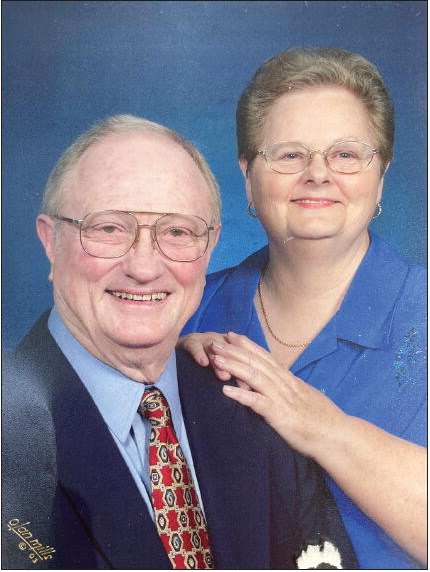
MARTHA AND JACK — They met in a restaurant and they spent much of their life together in the restaurant business. Martha Parson developed the Vidalia Fruitcake Company and made the cakes in bulk; and Mr. Jack crafted the boxes in which they packed them.
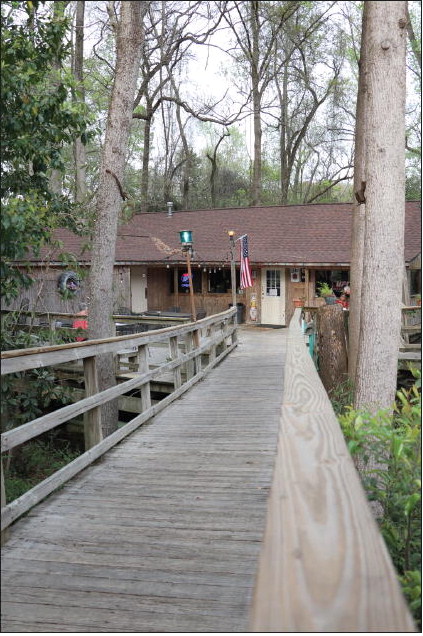
DINNER IN THE WOODS — “It was a party every night,” Mr. Jack said. Twenty-two years later and for four nights a week, the party continues.
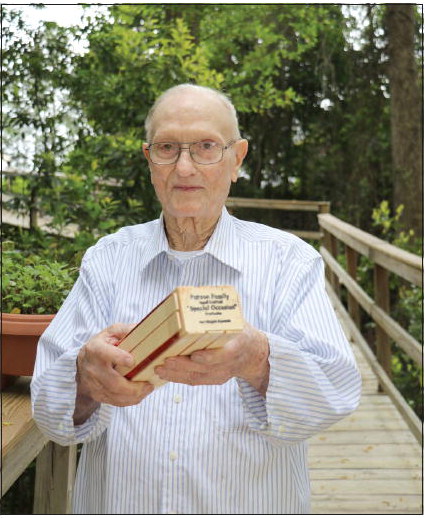
PARSON FAMILY FRUITCAKE — They developed their fruit-cake business out of necessity; however, it evolved into a significant piece of the local Parson legacy.



